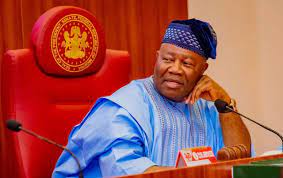“Character, in the long run, is the decisive factor in the life of an individual and of nations alike”. —- Former American President, Theodore Roosevelt. Before it was carved out of the defunct North-eastern state in 1976, the entity today referred to as Borno state lacked strong leadership which was the bane of the state. Politically, economically and socially, the state has overtime experienced moral decay. The decay manifested in political corruption, economic uncertainties, decline in family values, greed, crime, etc. Sometimes, one shudders at the kind of people that were elected or appointed into political offices from the state – people that talk anyhow, ill-tempered, ‘fantastically corrupt’, without foundation in leadership, without ideology, focus, goals, and direction. In other words, there were many ‘characters’ in the state’s political drama lacking character!This reminds one of ‘The 7 Blunders of the World’ postulated by the great Indian leader, Mahatma Ghandi. Three of the ‘Blunders’ that are related to this article are: Knowledge without Character, Wealth without Work, and Politics without Principles. And because in Borno state, like in other climes, there are politicians in the same party without principles, that’s why the state has what’s best referred to as ‘Political Hypocrites’ that have overtime blocked the chances of tested hands to either govern the state or put to practice their commitment to the development of the state until 2011 when Kasheem Shettima arrived the scene.The late Dr.Myles Munroe alluded to the fact that because political/governmental leadership gives priority to other qualities of leadership other than character, Borno state has produced…”Charismatic Leaders without Character; Gifted Leaders without Convictions; Powerful Leaders without Principles; Intellectual Leaders without Morality; Visionary Leaders without Values…” This probably conforms to the saying that “the people get the kind of leaders they deserve”.If my memory serves me right, the state since creation seems not to disappoint when it comes to ‘Character Deficiency’ in political leadership. Many were tested and ended-up disappointing the people. In 2019, the state got a leader through conviction of his determination to serve with passion and unchain the chain of retrogression and insecurity not minding the consequences. Take, for instance, the ongoing fruitless effort to smear the reputation of sleepless Governor Babagana Umara Zulum spearheaded by political rogues.
That is a typical case of powerful leaders without principles.Judging from the unfolding comedy master-minded by supposedly respected indigenes of Borno state, there is a wide difference between public servants/politicians of today and the founding fathers of democracy. The founding fathers offered selfless service to the state; most opponents to the erudite scholar are engaged in the trade for fear of the obvious. The founding fathers gave priority to character building; those opposing the governor prefer to create crises. In the days of the founding fathers, Borno state was a respected entity and cradle of knowledge that had leaders of character. They exerted influence on national and international arena because their words were congruent with their actions. The level of moral depravity exhibited by some of those opposing the laudable objectives of the Peoples Governor is unbecoming of their societal status. It seems most of them have nothing to stand for. Little wonder, Martin Luther King Jr. said, “If a man hasn’t discovered something he will die (stand) for, he isn’t fit to live”.Where will all the mudslinging lead Borno state to? Of course, the state is paying and may continue to pay for the dire consequences of character deficiency on the part of politicians across party divide. Some of such negative effects of character deficiency are: (1) It has created a psyche of high distrust among the electorate – most people no longer trust the politicians and political appointees, no matter how good-intentioned they may be; (2) The character flaws of a politician often end up hurting the electorate. For instance, the trumpeting of fictitious and spurious publications of ridicule against the tested democrat in Borno state are caused by fear, ineptitude, cluelessness, sadism, hatred and intentional diversion of attention from set objectives. Yes, “A leader’s values may be personal”, said Munroe, “but they are never private”.
(3) It can tarnish the reputation of the government and the state. The allegations against Prof. Zulum are physical assaults to paint his government black to cause backwardness and under-development of Borno state that is already enveloped by insecurity. Of course, Borno state is underdeveloped not because it lacks resources or human capital, but because it lacks committed leaders who are resourceful with its abundant natural resources. Most of the people are living in abject poverty in the midst of plenty because of the refusal of those that are supposed to support the governor to serve with passion. Indeed, “character defects are like sleeping snakes that awaken and strike people,” said Munroe.However, in as much as the opponents of the progress of the state are saturated with character deficiency, the state still has an infinitesimal number of politicians with strong character. However, for the state to attain the status of greatness, it desperately needs aides of impeccable character that possess rock-laden convictions stronger than their fears. They should be people who exert influence since leadership is all about influence. “The essence of influence is the ability to motivate people to take action and effect change,” writes Munroe, “You can’t lead if you don’t influence…” And genuine followers are only influenced by leaders of character. When Roosevelt observed that character is the decisive factor in the life of an individual and of nations, it tells us of the imperative of character in political leadership. All states that advanced economically, politically and socially are in my view, are states that had political leaders with character at different times unlike in Borno where most leaders were either deserted by the elite and alike or hated before tenure expiration.Character is the foundation of all aspects of effective leadership. There is no true leadership without character. In fact, there’s no substitute for character in leadership! It is indispensable! Therefore, if the people must make progress, the political leaders have no option but to rally round the governor and build strong character. Because, according to Munroe, “Leaders influence the mind-set of the people; they influence the morality of the followers; they influence the commitment of the followers; and they influence the destiny of the followers”.It is, therefore, the hope of Borno state well wishers with earnest desire that the state’s political leaders would wake up to realising the fact that character deficit is the main source of the state’s sore troubles.
To this end, the people must give priority to character development in political leadership and support the noble objectives of their leaders to sail. Anything short of that, those charlatans beating the drums of hatred for a show down may eventually ground the state to a halt from their actions of greed if allowed to advance to the next stage of character assassination.Boko Haram insurgency was inherited by Prof. Zulum in 2019 from his predecessor. His predecessor, Sen. Kashim Shetima, inherited the insurgency from his predecessor, Sen. Ali Modu Sheriff. Both Shetima and Zulum have exhibited total commitment to defeating the insurgents for return to normalcy in Borno. But, the situation remains worrisome worth a change of tactics.Abubakar is a stakeholder in Greater Borno Project




